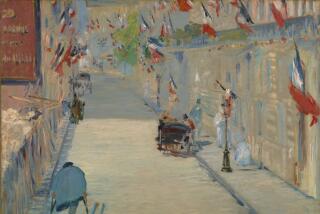Paris is a moveable feast--even if you’re glued to your seat at a sidewalk cafe
- Share via
Hemingway wrote that if you were lucky enough to have lived in Paris in your youth, then it would stay with you the rest of your life, wherever you went, because “Paris is a moveable feast.”
You don’t have to be young, or to live there. Being in Paris even for a few days, at any age, is a moveable feast. If I could be in Paris only one day, it would be worth it; and if I could be in Paris only one hour, I would take it, despite the rigors of that airplane flight.
If I had but one hour to spend in Paris I would not spend it in Notre Dame, or in the Louvre, but at a table on the sidewalk at the Cafe des Deux-Magots, on the Left Bank, eavesdropping on the other patrons and watching the people walk by. Surely an hour spent lingering there over coffee or a glass of wine is an experience never to be forgotten, more spiritually fulfilling than Mass in Notre Dame. You are reassured that you are alive and living on a civilized planet.
One morning when my wife had taken the train to Tours to visit our daughter-in-law’s mother, I walked down the Rue de Rivoli to the Palais Royal, which I had never before investigated, and went into its enormous gardens. They looked to me as long as four football fields, with a great fountain at the center. There were just enough people scattered about to give the impression that the Earth was not deserted; but obviously it had not been discovered by my fellow tourists.
Little old ladies dozed in the early October sunlight on chairs, hands folded in their laps; young mothers pushed infants about in perambulators; a young man followed patiently after a small boy kicking a ball; young couples embraced as they walked; pigeons flourished.
I sat on an iron bench and watched this tranquil scene in the heart of the teeming city. It was the first moment I’d had for simple reflection since we arrived in Paris. Then it occurred to me that I was just a part of the picture: an old man sitting on a bench in the park.
In front of the tall iron fence that separated the courtyard from the gardens, a television crew had set up, evidently to shoot a scene for some series. A track had been laid down for a big camera to move back and forth on, and it was focusing on a bench against the fence.
First, a young couple in raincoats walked through a gate and past the bench. Then a rather dumpy middle-aged man, bald and dapper, came along and sat on the bench. He unfolded a newspaper and began to read. Then a man came into the picture feeding pigeons. A cloud of pigeons followed him and surrounded the fastidious fellow on the bench. At first he was merely annoyed; then he was distressed. He folded the paper and swiped angrily at the pigeons.
They set up to shoot it over again. I guessed that the man was the hero of a detective series: Hercule Poirot, perhaps, or Inspector Maigret. I stood off to one side, thinking myself out of the picture, but a man with a walkie-talkie hurried toward me, shouting “Monsieur!” and motioning me to back out of the way.
I felt rather important. It was a form of recognition. There I was, merely a tourist, and I had been kicked out of a Parisian television scene. One never knows how important one might be.
We had been advised not to go to the Folies-Bergeres. It was said to have gone tawdry. There were better shows. But I wanted to do all the traditional things, and I had never been to the Folies.
I wanted to have a drink at that bar in the wonderful painting by Manet, with the Champagne bottles and the yellow roses and the bowl of tangerines on the bar, and that winsome young woman behind it. Of course I knew the bar wouldn’t look like that anymore, and the young woman would be gone.
We found our way to the Folies on the Metro. The show was great. Considering that Paris offers one a choice of unabashed pornography, it was rather tame. Of course the chorus danced bare-breasted most of the time, and it seemed miraculous to me that the casting director had found so many leggy girls who looked as if they had come out of the same pod, right down to the size of their rather small but firm and shapely breasts.
The costumes were opulent; the pace never lagged; and the star was a tall, voluptuous, athletic black woman with her head shaved egg-clean. She reminded me of O. J. Simpson with a bosom.
After the show we went to the bar for a drink. The bartender was a thin, saturnine man with a black mustache. I ordered a split of Champagne, which was just enough for two glasses; it cost $10.
Oh, well, we have now been to the Folies-Bergeres.
Not to be thought entirely frivolous, on Sunday we went to Mass in Notre Dame, and stood at the back of that awesome space as a thousand worshipers responded to the nasal singing of the priests.
Somehow Notre Dame has survived the onslaught of tourism. It is too big, too ancient and maybe too holy to become merely another sight.
Unlike the bar at the Folies-Bergeres, it goes on, unchanging, forever.
More to Read
Sign up for The Wild
We’ll help you find the best places to hike, bike and run, as well as the perfect silent spots for meditation and yoga.
You may occasionally receive promotional content from the Los Angeles Times.






